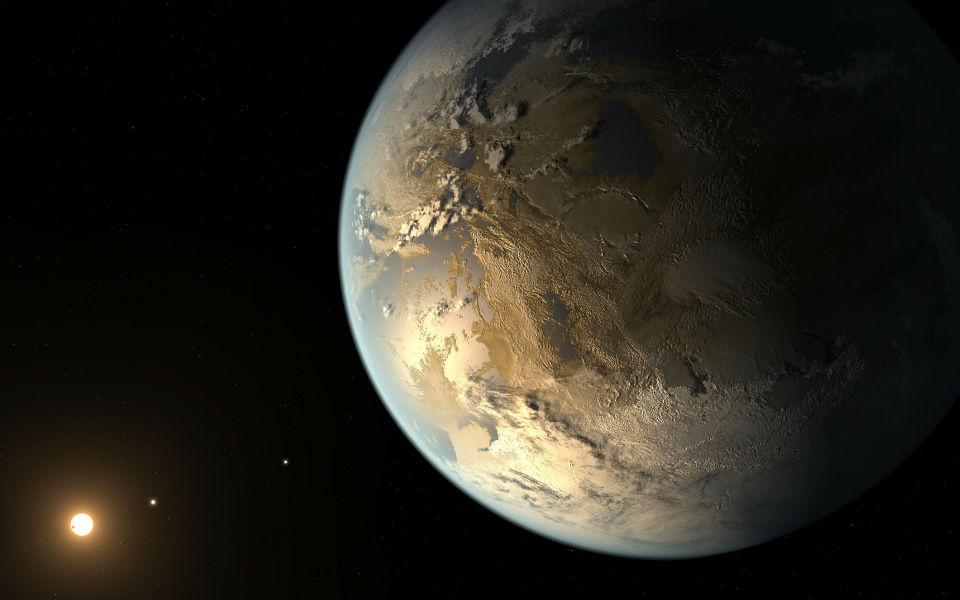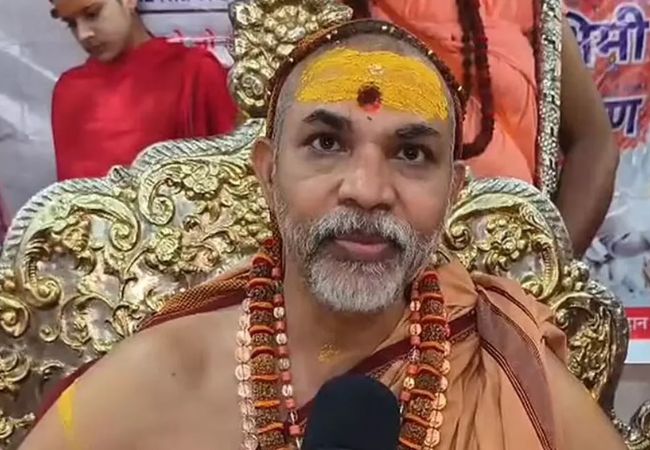London, May 8: Astronomers have found that a planet outside our solar system, which is similar to Saturn in mass and exceeds the size of Jupiter by 20 per cent, has an atmosphere free of clouds.
The hot gas giant, WASP-96b, periodically transits a Sun-like star 980 light years away in the southern constellation Phoenix.
Using the the European Southern Observatory's Very Large Telescope in Chile, the team studied the atmosphere of WASP-96b when the planet passed in front of its host-star.
This enabled the team to measure the decrease of starlight caused by the planet and its atmosphere, and thereby determine the planet's atmospheric composition.
"We've been looking at more than twenty exoplanet transit spectra. WASP-96b is the only exoplanet that appears to be entirely cloud-free and shows such a clear sodium signature, making the planet a benchmark for characterisation," said lead author of the study Nikolay Nikolov from University of Exeter in Britain.
Just like an individual's fingerprints are unique, atoms and molecules have a unique spectral characteristic that can be used to detect their presence in celestial objects.
The spectrum of WASP-96b shows the complete fingerprint of sodium, which can only be observed for an atmosphere free of clouds, according to the study published in the journal Nature.
It has long been predicted that sodium exists in the atmospheres of hot gas-giant exoplanets, and in a cloud-free atmosphere it would produce spectra that are similar in shape to the profile of a camping tent.
"Until now, sodium was revealed either as a very narrow peak or found to be completely missing. This is because the characteristic 'tent-shaped' profile can only be produced deep in the atmosphere of the planet and for most planet clouds appear to get in the way," Nikolov added.
Clouds and hazes are known to exist in some of the hottest and coldest solar system planets and exoplanets.
The presence or absence of clouds and their ability to block light plays an important role in the overall energy budget of planetary atmospheres.
"It is difficult to predict which of these hot atmospheres will have thick clouds. By seeing the full range of possible atmospheres, from very cloudy to nearly cloud-free like WASP-96b, we'll gain a better understanding of what these clouds are made of," explains study co-author Jonathan Fortney, Professor at University of California, Santa Cruz (UCSC), US.
Let the Truth be known. If you read VB and like VB, please be a VB Supporter and Help us deliver the Truth to one and all.
Lucknow (PTI): The Uttar Pradesh Congress on Wednesday staged a statewide protest demanding a fair and transparent inquiry into the FIR lodged against Swami Avimukteshwaranand Saraswati and those who filed the complaint against him.
In a statement issued here, the party said memorandums addressed to Prime Minister Narendra Modi were submitted through district magistrates in all districts of the state.
Uttar Pradesh Congress spokesperson Manish Hindvi told PTI that the memorandums were handed over through the district administration in all 75 districts.
In the memorandum, the party alleged that Saraswati and his disciples were "unnecessarily harassed and humiliated" by police on the occasion of Amavasya and were prevented from taking a ritual bath (at the Magh Mela). It further alleged that some disciples were manhandled and taken to a police station.
The memorandum also claimed that an FIR was later registered against Saraswati, his disciple Swami Mukundanand Brahmachari and several unidentified persons in a sexual harassment case. It termed the case a "conspiracy" aimed at tarnishing the seer's reputation.
Citing Articles 25 and 26 of the Constitution, the memorandum stated that these provisions guarantee religious freedom and the right of religious denominations to manage their own affairs.
It described the position of shankaracharya held by Saraswati as "one of the highest spiritual posts in Sanatan tradition" and alleged that the entire episode appeared to have been "orchestrated in a planned manner".
"We request that the background of the persons who got the FIR registered be investigated in a transparent manner by a retired high court judge and strict action be taken against them," the memorandum said.
It also sought a "fair and transparent probe" into the allegations levelled against Saraswati so that the truth could be established.
Earlier, Uttar Pradesh Congress president Ajay Rai had told reporters in Varanasi after meeting Saraswati that the party stood firmly with him.
The Congress said it would continue to press for an impartial inquiry into the entire episode.
On February 21, an FIR was lodged in Prayagraj against Saraswati and his disciple Mukundanand Brahmachari on charges of sexually abusing two persons, including a minor, over the past year at a gurukul and religious congregations, including the recently concluded Magh Mela.
Days after he was booked, Saraswati had said on Monday that he would not oppose his arrest and asserted that the "fabricated story" would be exposed sooner or later.
At a press conference on Wednesday, Saraswati alleged that criminals rule in Uttar Pradesh, level allegations and influence investigations, as he denied having any contact with the two persons for whose alleged sexual abuse he has been booked.



_vb_77.jpeg)
_vb_00.jpeg)
